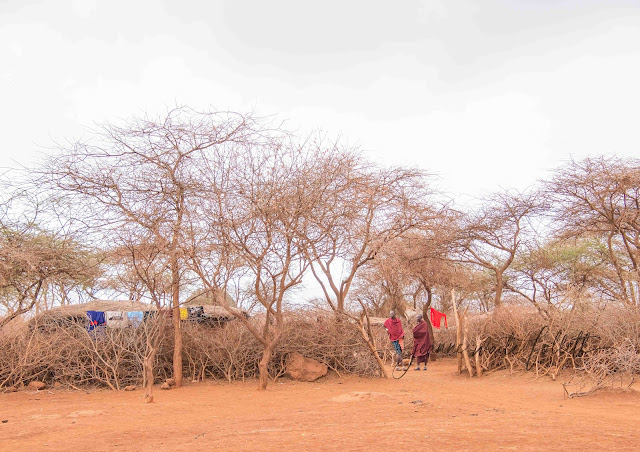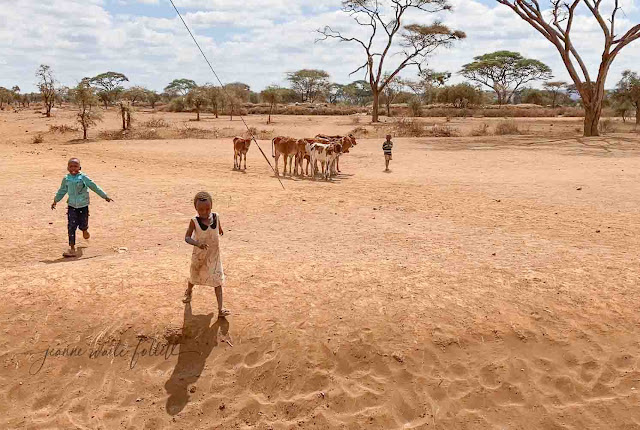Chapter 13
A Moving Day
We have moved four times in the last four months. We were trying to follow the rain – moving according to where the rains were supposed to come. But they haven’t. If the rains don’t come, none of us will survive.”--Farhia Mohamad Geedi, nomadic pastoralist in Africa
The title of this chapter is "A Moving Day." I was going to add, "A Moving Day: In More Ways than One." I decided not to as that will become apparent in this story.
***
I'm up early to finish last minute packing. Marg has already left the tent for the main pavilion. I put my last bag with the rest of our luggage, zip up the tent, and fasten the pulls with a small carabiner. Vervet-proofing, until those clever monkeys learn how to open the carabiner.
This is the first time we are in camp for daybreak and I see Mt. Kilimanjaro almost clear of clouds.
The waterhole is seeing early visitors.
 |
| An eland |
Watch the video!
 |
| Beautiful superb starling. |
I take this photo as we head out to get in the vehicles.
A young boy stands beside the highway. As we near, I hear him cry, "Water."
I want to throw my water bottle out for him, but I don't. Instead, while his cry carves deep fissures into my heart, I think of the morning we spent with Craig, the super tusker elephant. On the way back, several villagers were heard crying "eeeeeeeeee" and holding out hands. I finally figured out they were saying "please."
As the guides and drivers say, "If you stop for one, you have to stop for all."
I was thinking about the starving animals and wondering how the people were coping with the drought. I didn't know if they were begging just because or if they, too, were starving.
A bit farther on, I saw three young children, perhaps between five and seven years old, herding some walking skeletons out to the road. I could not believe the cattle, about six or seven of them, could even stand much less be led to whatever feed could be found.
Our driver stopped and held out two apples. Two kids came running while a third stayed with the small herd. I looked at him and could see the look of hope on his face. Our friends's vehicle stopped behind us and held out something for him.
I thought about those young kids having the responsibility of herding the cattle and what would happen if one died? Would the burden be too much for them to bear? And then I began comparing their heavy responsibility to the kids in America. It was not a good thought.
Farther on, two kids are beside the road. One is eating with a look of happy bliss. It appears to be fruit, perhaps an apple.
We turn off the road. This is the village to which we want to donate some money, in lieu of a village visit. Most camps offer the option to visit a nearby village for the cultural experience. There is generally a small fee involved that will assist the village.
 |
Villages are surrounded by a boma, which is a fence made of thorny trees, bushes, and branches. They are to prevent predators like lions from getting into the village. |
At Tawi, we had that option also, at a small charge of $20.00. Time constraints were considered and we opted out of the visit but arrived at the decision to make a donation.
For me, in additional to being a mosquito magnet, I am also a hawker magnet. Any street or shop vendor selling something homes in on me with laser beam eyes. I've been mobbed in China. Chased down a road in India with the hawker jumping on the rear bumper, still trying to sell me a piece of junk.
 |
| Cell phone photos are so unforgiving. |
I currently have twelve insect bites on my arms and some on my legs, despite wearing long pants and a long sleeve SPF shirt. I also have a black eye, courtesy of an insect bite or two.
I can't avoid the hawkers and I have yet to learn how to handle the interaction and not be rude. Usually, I keep saying "no" and if that doesn't work, I latch on to one of our group for protection.
Once, when I asked for help, a husband and wife grabbed my arms and escorted me through a large group of hawkers and wouldn't let anyone near me.
All of us but Randy have done these visits before and there will likely be another chance for him. We arrived back at camp one day to see a small freight van unloading bales of hay. A man on a motorbike had two bales strapped on his bike.
We learned that Tawi Lodge had purchased this load of hay and was giving it to pastoralists. We talked about donating the $20 for more hay, donating money to a village, and so on. We settled on donating $20 each and giving it to a village chief because he would know the best use for the funds.
We thought we would pull in, hand the KES1400 (shillings) to the chief, and be on our way. The chief wasn't having any of that.
 |
| A prayer, some dancing, and our village, he promised. |
He greets us with a big smile, tucks the cash inside his shuka (a traditional body wrap similar to a toga), and launches into his spiel.
We can see villagers lined up inside the boma, waiting for us.
Oh, dear.
I think about hiding in the truck. That won't work, I decide, because I'm not nimble enough to curl up in the footwell, so I get out with the others. The chief goes on for long minutes, talking about praying, dancing, and seeing the village.
So, here we go. After the prayer, the dancing starts. It is delightful to watch and to hear. Their bodies bob in rhythmic unison and then the jumping begins. Each warrior tries to jump as high as he can from a flat-footed start. The warrior who jumps the highest earns the respect of his fellow warriors.
I wonder if the jumping began as a way to spot predators in the grassy savannah where they herd their livestock?
All of a sudden, a warrior comes forward and extends his hands to Randy, luring him into the bobbing and dancing. Soon, Randy is in line with the group.
Maasai are polygamous and I wonder if they thought we six women were Randy’s wives and that he should be chosen first..
One by one, a Maasai approaches each of us and repeats the procedure.
 |
| Cory and her warrior. |
 |
| Sylvia and her dance partner. |
I am one of the first ones and this time it's by a woman. A Maasai grabs my camera and starts talking photos. My camera! I'm too self-conscious about this to object. A toddler seems fascinated with me and he becomes my dance partner.
 |
| Marg uses her cell phone to take a photo of the young boy. |
 |
| High-fiving my dance partner. |
 |
| One day I say, "I can't tell the goats from the sheep." Others agree. Marg, the veterinarian, gives us the magic key: "Tails up--goats. Tails down--sheep." |
 |
| Africans have exceptional eyesight, especially in darkness. The hole is for light and to let out the smoke from a fire. |
I'm very interested in this hut and wish I had a flashlight. There is another room for the children, but it is in total darkness. What I don't see anywhere is evidence of people living here. There are no personal belongings at all, and my skepticism rises. Perhaps, I think, he gathered cup the belongings and dumped them in the kids' room or a neighbor's.
The fire-making demonstration is fun. The longer it takes to get a spark, the more help the fellow gets from other men.
 |
| The marks on this man's cheeks are Maasai symbols of his tribe. |





































Thanks so much for sharing your experiences during your visit to the village. It's interesting to think of what is shown for tourists rather than their real lives and challenges. I would also have a hard time walking past all the villagers selling wares and not feel obligated to buy things.
ReplyDeleteI have a difficult time deciding what is authentic and what is for show. After this, we often asked our different guides if they lived in huts or houses. 3 to 1 it was huts.
DeleteVery interesting and at the same time a very serious Post Gullilble. In my India travels, I too wanted to help so many people-in-need and learned very quickly IF YOU HELP ONE you have to help them all. I began by giving one starving child a small package of cookies. Within one nano - second (where they all came from I'll never know !!) I was literally surrounded by a crowd of starving children. So I broke open another package of cookies and gave one cookie to each child and immediately ran out of cookies. Then this small mob of starving children got angry demanding a cookie. Ten 40 pound children holding onto your arm is 400 pounds. I could barely break their hold. We sure enjoy your Posts. Sign us .. Cap and Patti
ReplyDeleteIt’s tough. You never know what the real circumstances are. I watched some women begging in Mexico. At 5o’clock, they were picked up by-a nice nine passenger van. Organized panhandling.
Delete